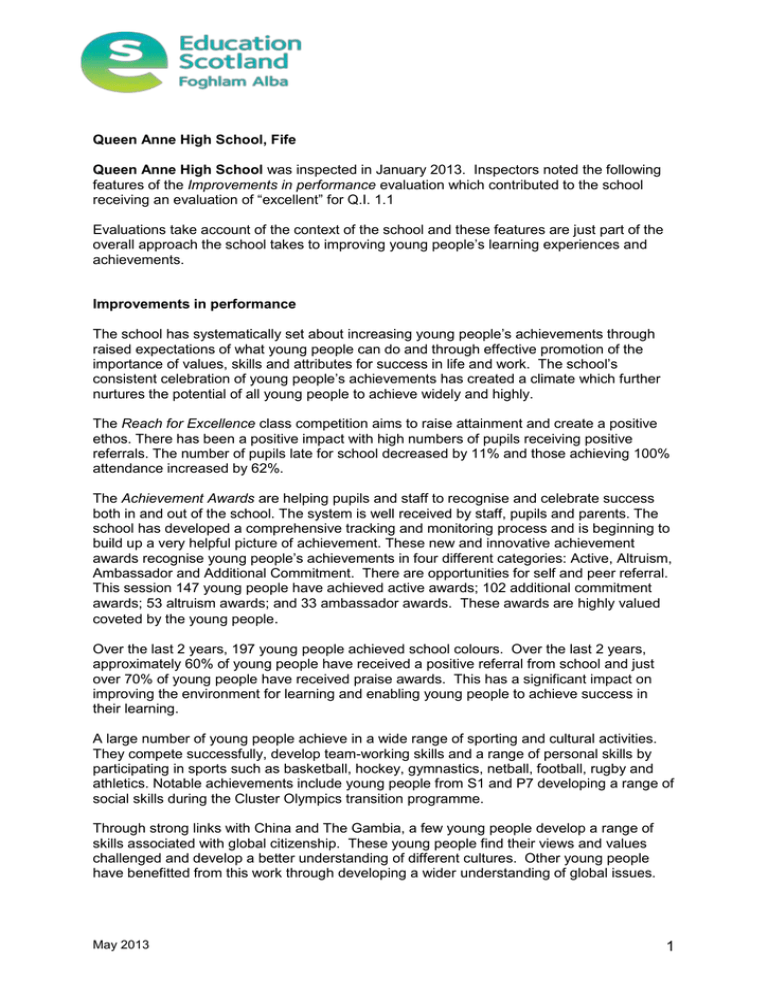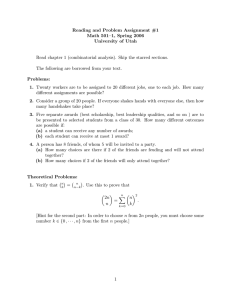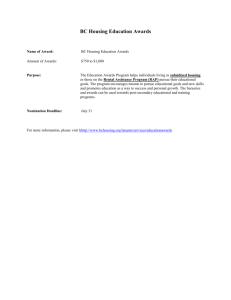Document 12954475
advertisement

Queen Anne High School, Fife Queen Anne High School was inspected in January 2013. Inspectors noted the following features of the Improvements in performance evaluation which contributed to the school receiving an evaluation of “excellent” for Q.I. 1.1 Evaluations take account of the context of the school and these features are just part of the overall approach the school takes to improving young people’s learning experiences and achievements. Improvements in performance The school has systematically set about increasing young people’s achievements through raised expectations of what young people can do and through effective promotion of the importance of values, skills and attributes for success in life and work. The school’s consistent celebration of young people’s achievements has created a climate which further nurtures the potential of all young people to achieve widely and highly. The Reach for Excellence class competition aims to raise attainment and create a positive ethos. There has been a positive impact with high numbers of pupils receiving positive referrals. The number of pupils late for school decreased by 11% and those achieving 100% attendance increased by 62%. The Achievement Awards are helping pupils and staff to recognise and celebrate success both in and out of the school. The system is well received by staff, pupils and parents. The school has developed a comprehensive tracking and monitoring process and is beginning to build up a very helpful picture of achievement. These new and innovative achievement awards recognise young people’s achievements in four different categories: Active, Altruism, Ambassador and Additional Commitment. There are opportunities for self and peer referral. This session 147 young people have achieved active awards; 102 additional commitment awards; 53 altruism awards; and 33 ambassador awards. These awards are highly valued coveted by the young people. Over the last 2 years, 197 young people achieved school colours. Over the last 2 years, approximately 60% of young people have received a positive referral from school and just over 70% of young people have received praise awards. This has a significant impact on improving the environment for learning and enabling young people to achieve success in their learning. A large number of young people achieve in a wide range of sporting and cultural activities. They compete successfully, develop team-working skills and a range of personal skills by participating in sports such as basketball, hockey, gymnastics, netball, football, rugby and athletics. Notable achievements include young people from S1 and P7 developing a range of social skills during the Cluster Olympics transition programme. Through strong links with China and The Gambia, a few young people develop a range of skills associated with global citizenship. These young people find their views and values challenged and develop a better understanding of different cultures. Other young people have benefitted from this work through developing a wider understanding of global issues. May 2013 1 Musical skills, team working, social skills and confidence in performing in front of an audience are developed through participation in the wide range of musical groups. These include a full orchestra, string group, jazz band, choirs, guitar group and unusually, the handbell group. They play in a range of settings throughout the year and in doing so develop strong organisational skills and a sense of pride in their achievements. They participate very well in a range of school activities, including the Christmas service and school shows. Over the last three years, 94 young people have been successful at different levels of the Associated Board music examinations. A few young people recorded a CD of their own music which helped them to understand the recording and advertising process. A few developed their creativity further by producing a music video. The music produced on the CD is of a very high quality. Many young people gain resilience and critical skills by exhibiting their work in the school art gallery and in public places across the school. They also exhibit their art work in a local residential home and helped to produce a large mural for the local first division football club. Through the school’s Art in Public Places project young people successfully explore their potential as artists and develop skills of reflection, working with others and enhanced creativity. Through the school’s Confucious Classroom initiative, fourteen young people are sitting the HSK Chinese Proficiency Examination and eight are involved in British Council Mandarin Chinese speaking competition. The school uses a small range of accredited awards to recognise wider achievement. Over the last 5 years 94 young people gained a Duke of Edinburgh’s award (6 gold, 45 silver, 43 bronze). Over the last 3 years 32 young people gained Saltire awards for volunteering. The majority have gained certificates for 100 hours or more of voluntary work. Over the last five years, staff have worked to raise the attainment of young people in a number of areas and maintain a high level of attainment in others. Over the last 3 years, young people’s performance in external examinations is significantly above the national average on most measures. Most trends are consistent with national patterns and the number of young people gaining 5+ level 6 by the end of S6 has improved significantly more quickly than the national average over the past 5 years. By the end of S4, young people perform in line with or above national averages and better than comparator schools at 5+ levels 3, 4 and 5. The school has added value from PIPS predictions to national qualifications at 5+ level 5 in the last two years. By the end of S5, young people perform above the national average and much better than comparator schools at 1+, 3+ and 5+ level 6. The school consistently adds value from standardised test predictions to national qualifications at 3+ and 5+ level 6. By the end of S6, young people perform well above the national average and much better than comparator schools at 1+ level 7. The school consistently adds a great deal of value from standardised test predictions to national qualifications at 1+ level 7. Most of those young people who experience difficulty with their learning achieve well and leave school with a range of useful academic qualifications. Staff take great care to ensure that those who are disengaging receive accreditation in core skills. May 2013 2

